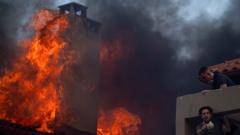Late Wednesday night, members of the International Olympic Committee (I.O.C.) convened at the illustrious Olympic Museum by Lake Geneva for a pivotal pre-election gathering. The next day, the spotlight would shine on seven candidates vying for the presidency of an organization that holds immense influence in global sports. Amidst the secrecy, outgoing president Thomas Bach took measures to keep candidates and members separated, joking that this would allow attendees to enjoy their meals in peace.
This election, set for March at a southern Greek resort, follows a long-standing tradition of opacity within the I.O.C., leading many candidates to voice frustrations about the restrictive rules that stymie their ability to connect with members and the public. Public debates are off the table, candidates cannot criticize each other's proposals, and endorsements are strictly forbidden.
Among those running is Prince Faisal bin Al Hussein, a member of global royalty and the only such candidate in this race. Joining him are prominent figures in international sports, such as Juan Antonio Samaranch—whose father previously led the I.O.C.—and Sebastian Coe, a decorated Olympic athlete. Notably, Kirsty Coventry, an Olympic champion swimmer from Zimbabwe, is breaking ground as the first female candidate and the first person from Africa to contest for the presidency.
While the reality is that the I.O.C. leads a multi-billion dollar operation with the potential to influence global diplomacy, much about this election remains shrouded in mystery. After their formal presentations—held in a controlled environment mimicking a papal conclave—the candidates were whisked away to await a decision that will ultimately reflect their leadership visions.
The I.O.C. claims a unique autonomy, yet this exclusivity has led to accusations of diminished democratic engagement, with many members regretting the shift away from debate. Longtime member Syed Shahid Ali lamented how inner discussions have quieted, posing risks to transparent decision-making within such a powerful organization.
The upcoming election poses fundamental questions about future governance. Candidates like Samaranch and Coventry tout the need for a more inclusive approach, signaling potential shifts in how Olympic host cities are selected—an area that has recently come under control from the I.O.C.'s leadership.
As anticipation builds, speculation grows regarding Coventry's possible backing from Bach amidst tight-lipped I.O.C. delegates. The winner will inherit a complex array of challenges, particularly aiming for influential partnerships in the U.S. and managing the contentious landscape leading to the Los Angeles 2028 Olympics.
The clock is ticking for candidates, who now must rally support before the voting concludes at this prestigious assembly. Samaranch hopes to forge connections as the final countdown begins, highlighting a more communal spirit as candidates push to share their visions for the future of Olympic sports governance.




















